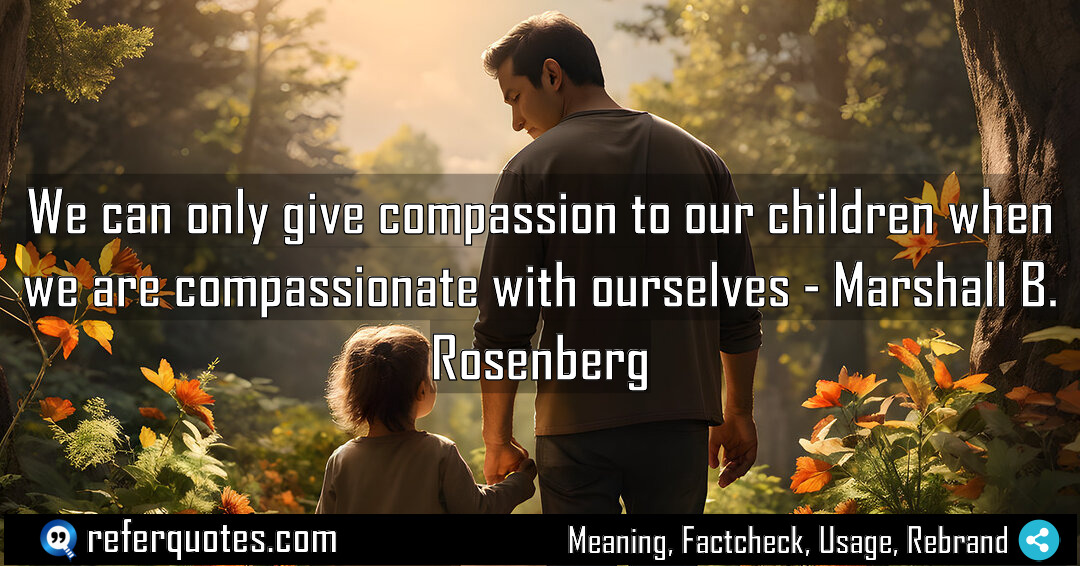
You know, that idea that “We can only give compassion to our children…” is so much more than a nice sentiment. It’s a functional truth about emotional bandwidth. If your own well is dry, you simply have nothing left to give, no matter how much you love them.
Share Image Quote:
Table of Contents
Meaning
The core message is that self-compassion isn’t selfish; it’s the essential fuel for compassionate parenting. You can’t draw from an empty cup.
Explanation
Look, I’ve seen this play out so many times. A parent is beating themselves up for losing their temper, and then they’re trying to be this perfectly calm, understanding guide for their kid. It creates this internal conflict that’s just… exhausting. Rosenberg’s point is that the kindness you offer your child has to flow from the same source as the kindness you offer yourself. It’s one stream. When you’re harsh with yourself for making a mistake, that harshness *will* leak out, often directed at the very people you’re trying to protect. It’s not about being perfect. It’s about treating your own struggles with the same empathy you aspire to have for your child’s. That’s where the real, sustainable patience comes from.
Quote Summary
Reading Level66
Aesthetic Score90
Origin & Factcheck
This comes straight from Marshall B. Rosenberg’s 2005 book, Raising Children Compassionately, which is a cornerstone of his Nonviolent Communication (NVC) work. You sometimes see similar ideas floating around in mindfulness circles, but this specific phrasing is authentically his.
Attribution Summary
Where is this quotation located?
| Quotation | We can only give compassion to our children when we are compassionate with ourselves |
| Book Details | Publication Year/Date: 2004; ISBN/Unique Identifier: 9781892005140; Last edition: PuddleDancer Press, 1st Edition, 48 pages. |
| Where is it? | Chapter: Self-Compassion in Parenting, Approximate page from 2004 edition |
Context
In the book, this isn’t just a standalone tip. It’s embedded in the framework of NVC, which is all about connecting with our own feelings and needs so we can better connect with others. He frames parenting not as a set of commands, but as a relationship built on mutual understanding. And that understanding has to start with the parent.
Usage Examples
So how does this work in the real world? Let me give you a couple of scenarios.
- For the Overwhelmed Parent: Instead of thinking “I’m a terrible parent for yelling,” you pause and acknowledge, “Wow, I’m really overwhelmed and need some quiet.” That self-empathy makes it 100x easier to then turn to your child and say, “I’m sorry I yelled. We’re both upset. Let’s take a breath.”
- For Educators and Coaches: This applies to anyone in a guiding role. A teacher who forgives themselves for a bad lesson plan can bring more genuine patience to a struggling student. It models resilience.
- In Leadership: Seriously. A leader who is compassionate with their own missteps creates a psychologically safe team. The principle is universal.
To whom it appeals?
Share This Quote Image & Motivate
Motivation Score88
Popularity Score89
Shareability Score90
Common Questions
Question: Isn’t this just permission to be self-indulgent?
Answer: Not at all. It’s the opposite. Self-compassion is about honest self-assessment and accountability, but without the destructive self-judgment. It’s a tool for regaining your emotional balance so you can act more effectively, not an excuse to check out.
Question: What if I find it really hard to be compassionate with myself?
Answer: You’re not alone. That’s the work. Start small. When you make a mistake, just try saying to yourself, “It’s okay. I’m human.” That tiny shift can change the entire emotional trajectory of your day and your interactions.
Question: Does this mean I should never get angry or frustrated with my kids?
Answer: Absolutely not. The goal isn’t to be a robot. It’s to meet your own anger with curiosity—”What need of mine isn’t being met?”—so you can address the situation from a place of clarity rather than raw reaction. The frustration is a signal, not a sentence.
Similar Quotes
To raise compassionate children, we must first become compassionate toward ourselves. It’s a game-changing insight that flips traditional parenting on its head. The real work starts not with your child’s…
Children are born compassionate; they just need us to keep it alive. It’s a powerful reminder that our job isn’t to teach empathy, but to protect the innate kindness every…
To raise compassionate children, we must first… it sounds simple, right? But this is the real work. It’s not about a new parenting technique; it’s about a fundamental shift in…
When we model compassion, our children learn it. It’s less about what you say and more about what you *do*. Rosenberg’s insight is a game-changer for parents who feel they’re…
When we speak with compassion, children listen with trust. It’s a simple but profound truth that flips traditional parenting on its head. It’s not about control, but about connection. And…
